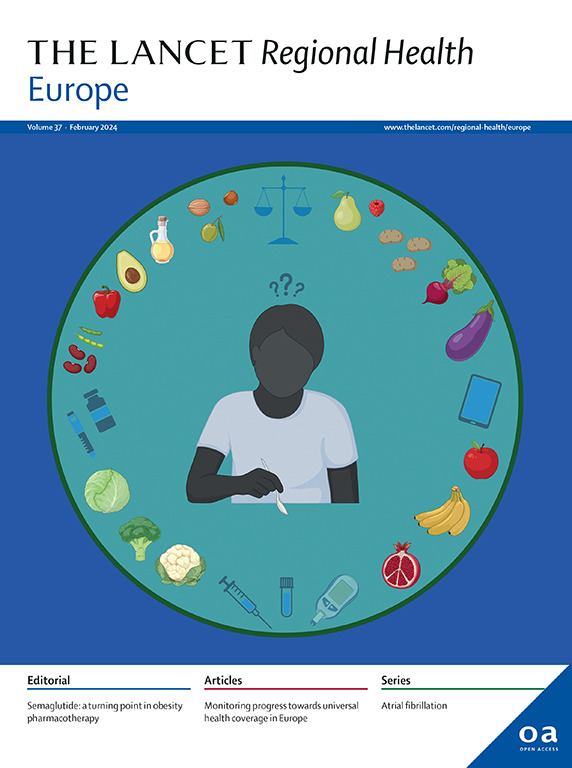Neurodevelopmental outcomes at five years in children born very preterm (24–31 weeks) exposed to opioids with or without midazolam: results from the French nationwide EPIPAGE-2 cohort study
IF 13.6
Q1 HEALTH CARE SCIENCES & SERVICES
引用次数: 0
Abstract
Background
Data on preschool neurodevelopment of preterm infants according to the duration of their neonatal exposure to opioids with/without midazolam is limited. We aimed to assess neurodevelopment outcome in children aged five years, born very preterm (24–31 weeks), according to exposure to these drugs.
Methods
Secondary analysis from the French prospective cohort study EPIPAGE-2 (Etude Epidémiologique sur les Petits Ages Gestationnels, 2011). Exposure to opioids with/without midazolam was classified as none, ≤7 or >7 days. Percentages were weighted to account for the study design. The primary outcome was moderate/severe neurodevelopmental disabilities (NDD). Analyses were conducted using logistic regression and adjusted for perinatal confounders.
Findings
Among 3117 survivors, 1165 (35.9%) were exposed (762/1165 (68.0%) ≤7 days, 403/1165 (32.0%) >7 days). Of these 49.5% received opioids only, 41.4% opioids and midazolam, and 9.1% midazolam only. Moderate/severe NDD occurred in 17.8%, 18.9%, and 31.7% in the unexposed, exposed ≤7 days, and exposed >7 days groups, respectively. After adjustment for baseline confounders, only exposure >7 days was associated with increased rates of moderate/severe NDD (adjusted odds ratio 2.07; 95% CI 1.32–3.26). After additional adjustment for severe neonatal morbidities no significant association was found between any duration of exposure and NDD.
Interpretation
Exposure to opioids with/without midazolam >7 days might be associated with a higher prevalence of moderate/severe NDD at five years in very preterm born children but severe neonatal morbidities are a major modulator of this association.
Funding
French Institute of Public Health Research, National Institute of Health and Medical Research, National Institute of Cancer, National Solidarity Fund for Autonomy, PremUp, APICIL Foundations.
5岁时极早产儿(24-31周)暴露于阿片类药物(含或不含咪达唑仑)的神经发育结局:来自法国全国EPIPAGE-2队列研究的结果
背景:根据新生儿接触阿片类药物(含/不含咪达唑仑)的持续时间,早产儿学龄前神经发育的数据是有限的。我们的目的是根据这些药物的暴露程度,评估5岁早产儿(24-31周)的神经发育结果。方法二级分析来自法国前瞻性队列研究EPIPAGE-2 (Etude epidsammiologique sur les Petits Ages Gestationnels, 2011)。有/不含咪达唑仑的阿片类药物暴露分为无、≤7天和>;7天。对百分比进行加权以说明研究设计。主要终点为中度/重度神经发育障碍(NDD)。采用逻辑回归进行分析,并对围产期混杂因素进行校正。3117例幸存者中,暴露者1165例(35.9%)(762/1165(68.0%)≤7天,403/1165(32.0%)≤7天)。其中49.5%只服用阿片类药物,41.4%服用阿片类药物和咪达唑仑,9.1%服用咪达唑仑。未暴露组、暴露≤7天组和暴露>;7天组中/重度NDD发生率分别为17.8%、18.9%和31.7%。调整基线混杂因素后,只有暴露>;7天与中度/重度NDD发生率增加相关(校正优势比2.07;95% ci 1.32-3.26)。在对严重新生儿发病率进行额外调整后,未发现任何暴露时间与NDD之间存在显著关联。在极早产儿中,有/没有咪达唑仑的阿片类药物暴露7天可能与5岁时较高的中度/重度NDD患病率相关,但严重的新生儿发病率是这种关联的主要调节因素。资助:法国公共卫生研究所、国家卫生和医学研究所、国家癌症研究所、国家自治团结基金、PremUp、APICIL基金会。
本文章由计算机程序翻译,如有差异,请以英文原文为准。
求助全文
约1分钟内获得全文
求助全文
来源期刊

Lancet Regional Health-Europe
Multiple-
CiteScore
19.90
自引率
1.40%
发文量
260
审稿时长
9 weeks
期刊介绍:
The Lancet Regional Health – Europe, a gold open access journal, is part of The Lancet's global effort to promote healthcare quality and accessibility worldwide. It focuses on advancing clinical practice and health policy in the European region to enhance health outcomes. The journal publishes high-quality original research advocating changes in clinical practice and health policy. It also includes reviews, commentaries, and opinion pieces on regional health topics, such as infection and disease prevention, healthy aging, and reducing health disparities.
 求助内容:
求助内容: 应助结果提醒方式:
应助结果提醒方式:


